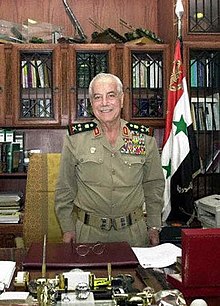Mustafa Tlas


Mustafa Tlas or Mustafa Tlass ( Arabic مصطفى طلاس, DMG Muṣṭafā Ṭalās ; * May 11, 1932 in ar-Rastan near Homs ; † June 27, 2017 in Paris ) was a Syrian general and politician. As a long-time defense minister and close confidante of Hafiz al-Assad and his son Bashar, he was at the center of the Ba'ath Party's regime in Syria for four decades .
Life
Tlas was born in 1932 in ar-Rastan (الرستن) was born in Homs Governorate and comes from a Sunni family of Kabyle origin. At the age of 15 he joined the Ba'ath Party .
He studied at the Military Academy of Homs and from 1951 made friends with the then higher-ranking air force officer Hafiz al-Assad , whose confidante he became. From 1958 to 1961 both were stationed in what was then the United Arab Republic , an amalgamation of Egypt and Syria, in Cairo . After the United Arab Republic was dissolved after a coup in Syria, both were arrested by the Egyptian authorities. After their return to Syria, both were dismissed from military service by the putschists because of their sympathy for Nasser . Tlas then took a civilian position in the Ministry of Supplies. After the Ba'ath Party's 1963 coup , Tlas was appointed to the party's military committee and was given command of the Syrian Army's 5th Tank Brigade . In 1964, President Amin al-Hafiz entrusted Tlas with the chairmanship of the military tribunal that tried activists of the Muslim Brotherhood . In 1965 he was appointed to the Revolutionary Command Council. During the Six Day War he commanded the reserves and presided over the high security court . After the defeat, he became the Army Chief of Staff. In 1970 Assad's rival Salah Jadid Tlas tried to depose, which led to Assad's coup and his sole rule. In 1972 Tlas was appointed Minister of Defense, an office that he would hold until Hafiz al-Assad's death.
In the 1970s he modernized the Syrian army with the help of the Soviet Union . In February 1982 he was responsible for the Hama massacre , which claimed tens of thousands of victims in the central Syrian city of Hama , including many members of the Muslim Brotherhood who were in opposition to the ruling Ba'ath Party.
After Hafiz al-Assad's death, Tlas remained at the center of the regime as a close confidante of Bashar al-Assad . In 2001 he was again Minister of Defense. In 2004 he resigned from the Syrian military after 52 years and retired from his political offices in June 2005.
Among other things, Tlas made a substantial fortune through forged end-user certificates for international arms dealers and smuggling into embargoed Iraq. His son Firas took over the business and built up a business empire.
He has published several books from his own hand and built up a publishing house in which, among other things, a new edition of the " Protocols of the Elders of Zion " was published. In 1983 he published an anti-Semitic book called “Matza of Zion” with a description of the Damascus affair of 1840. The medieval ritual murder legend is revived, according to which Jews would use blood to bake the matzo .
Tlas has two sons, Firas and Manaf Tlas , and two daughters, Sarya Tlas and Nahed Ojjeh , widow of the Saudi arms dealer Akram Ojjeh . Tlas left Syria in 2011 with his son Firas to receive medical treatment in France. His son Manaf deserted from the Syrian army in 2012.
Individual evidence
- ^ Syrian ex-defense minister Tlass died at the age of 85 in Paris
- ↑ a b Sami Moubayed: Steel an Silk - Men an Women who shaped Syria 1900-2000 , Seattle, 2006, pp. 89-91
- ↑ Publication from globalsecurity.org accessed in html format on August 1, 2015
- ↑ UN report of February 10, 2004 ( Memento of March 9, 2012 in the Internet Archive ) (English)
- ↑ http://actualite.nouvelobs.com/Manaf Tlass / (link not available)
| personal data | |
|---|---|
| SURNAME | Tlas, Mustafa |
| ALTERNATIVE NAMES | Tlass, Mustafa; مصطفى طلاس (Arabic) |
| BRIEF DESCRIPTION | Syrian politician and defense minister |
| DATE OF BIRTH | May 11, 1932 |
| PLACE OF BIRTH | ar-Rastan , Homs |
| DATE OF DEATH | June 27, 2017 |
| Place of death | Paris |